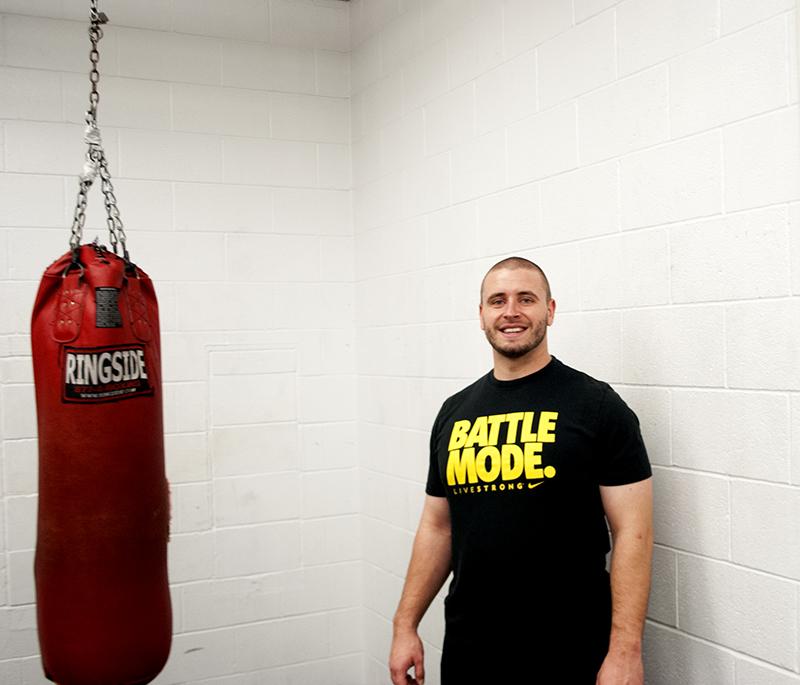In the Locker Room with Grant Butler
Grant Butler, new strength and conditioning coach
November 20, 2015
This week, the Review sat down with Oberlin College’s new Strength and Conditioning Coach Grant Butler to discuss his pre-Oberlin career, working out with Oberlin’s varsity teams and some useful weight lifting tips.
How long have you been a strength and conditioning coach?
This is going to be my sixth year. I started out at Athletic Republic for several years, then I worked at Carthage College — working with the varsity teams for two years — and now I’m here.
How have you enjoyed your time at Oberlin so far?
It’s been good. The community has definitely been interesting to work with, but the athletes have been awesome and bought into what we’ve been doing. It’s been a lot of fun for me and very rewarding in that sense. The people I work with are very supportive of me and supportive of everything that’s going on in the weight room. It’s been a good change from where I’ve been before.
What is one significant change from Carthage College that you have noticed working at Oberlin?
I had my own weight room at Carthage College. So the main difference here has been working around the community to make sure they get their work in, so that students get their work in, so athletes can get their work in, and so the faculty can get their work in. That’s the unique challenge that I’ve been presented with here: How do I get all those different groups to work together to get what they need while working around one another?
With that in mind, would you say that the limited space at Philips gym has represented the greatest challenge of your job so far?
It’s definitely been the biggest challenge. Every person needs something different and that spectrum is so wide. We have yoga classes that go on in our only plyometric room and at the same time we have a team next door trying to get loud and revved up for their workout. It gets interesting because you get conflicting needs, and then it’s a matter of how people can meet halfway and acknowledge that it’s impossible for anyone to get everything that they need. But there are enough resources available so that everyone can fulfill at least part of their weight room needs.
What common weight lifting mistakes or bad habits do you notice college students making?
Lack of mental preparation is always the biggest one. Be prepared before you go and get into the lift. If you’re not mentally prepared going into a lift, you’re going to struggle, and you’re not going to be as focused. One thing I notice about students — especially trying to get into the weight room for the first time or [getting] reacquainted to the weight room — is that they go from zero to 100 miles per hour, and they get burned out too quickly and get discouraged. So it’s one of those things where you need to slowly build yourself up to get to where you need to be; you can’t expect to be in peak shape 24/7, 365 days a year. Everything goes through cycles. [Those are] a couple of the biggest things I see from the weight room from an athlete and student perspective.
What advice would you give to someone with limited weight lifting experience who is looking to start lifting weights?
Definitely start on machines. Machines are simple; there are less things that can go wrong. They show you what you should be feeling and how to do an exercise. They’re a good, simple start to gain confidence. And once you begin to gain confidence, you can start to use dumbbells more, maybe even a barbell. So start slow, start easy, work your way up and definitely ask questions; it’s important to pick people’s brains. One of the things that I don’t think people understand is that the strength and conditioning community is a very accepting community. If you have a question, don’t be afraid to ask somebody such as myself or someone else in a weight room [who] looks like they know what they’re doing. People aren’t going to mind taking a couple of seconds to show you something or to give out a piece of advice. It’s very easily to be mistakenly intimidated in the weight room, especially by someone like me who is always very amped up and passionate about what they’re doing. There are a lot of people that mistake my passion for anger. I’ve been trying to build a relationship with the community, the students and the faculty so they know I’m just another friendly face, and if they have a question, they are comfortable enough to come and ask me about it.



















